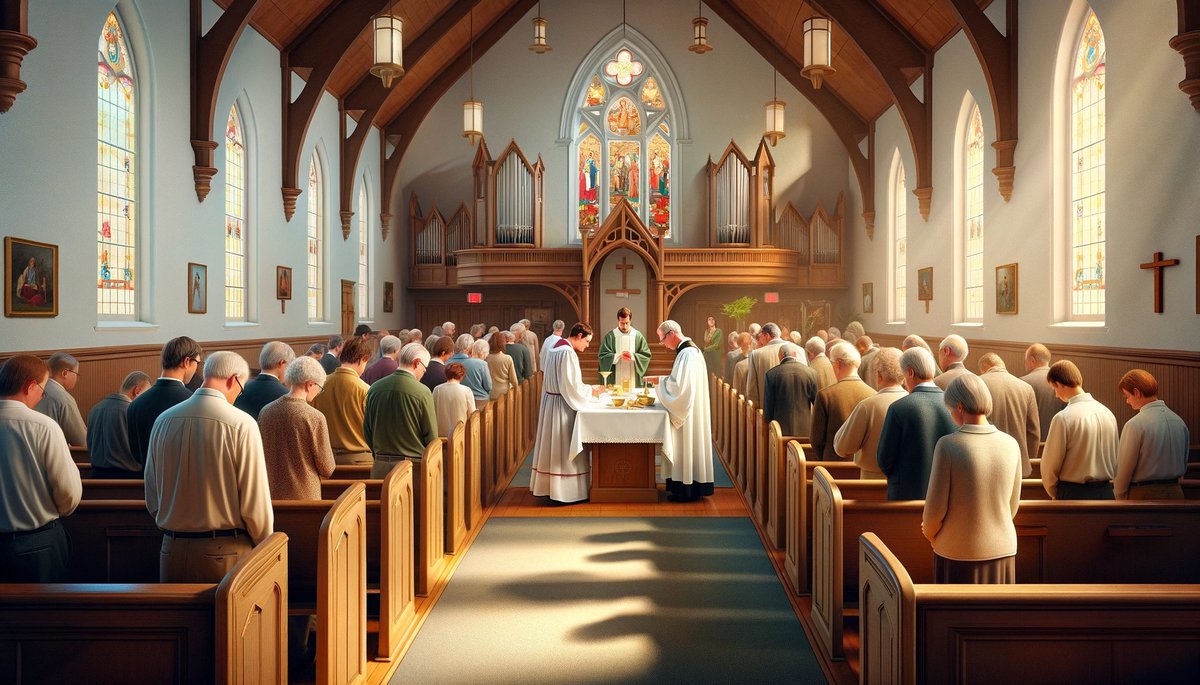Home>Theology and Spirituality>Who Can Assist With Communion In The LCMS?


Theology and Spirituality
Who Can Assist With Communion In The LCMS?
Published: February 19, 2024
Peter Smith, Editorial Director at Christian.net, combines deep insights into faith, politics, and culture to lead content creation that resonates widely. Awarded for his contributions to religious discourse, he previously headed a major organization for religious communicators, enhancing dialogue on faith's societal impacts.
Discover who can assist with communion in the LCMS and explore the theological and spiritual aspects of this important sacrament. Learn about the roles and responsibilities within the Lutheran Church-Missouri Synod.
(Many of the links in this article redirect to a specific reviewed product. Your purchase of these products through affiliate links helps to generate commission for Christian.net, at no extra cost. Learn more)
Table of Contents
Introduction
The Lutheran Church—Missouri Synod (LCMS) holds the sacrament of Holy Communion in high regard, viewing it as a sacred and central aspect of Christian worship. The administration of Communion involves a collaborative effort among ordained clergy and designated laypersons, each with distinct roles and responsibilities. Understanding the specific roles of pastors, elders, deacons, and lay assistants in the administration of Communion is essential for maintaining the integrity and reverence of this holy sacrament.
In this article, we will explore the various individuals who play a crucial part in the administration of Communion within the LCMS. By shedding light on the unique contributions of pastors, elders, deacons, and lay assistants, we aim to provide a comprehensive understanding of the collaborative nature of Communion administration in the LCMS. This exploration will offer insight into the theological and practical considerations that underpin the involvement of different individuals in this sacred act of worship.
As we delve into the distinct roles within the administration of Communion, it becomes evident that each participant contributes to the seamless and reverent execution of this sacrament. By recognizing and honoring the specific responsibilities entrusted to pastors, elders, deacons, and lay assistants, we can gain a deeper appreciation for the collective effort involved in ensuring that Communion is conducted with the utmost reverence and adherence to Lutheran doctrine.
Through this exploration, we will gain a deeper understanding of the collaborative and communal nature of Communion administration within the LCMS, emphasizing the shared commitment to upholding the sanctity and significance of this sacred sacrament. Let us embark on this journey to uncover the multifaceted roles that converge to facilitate the reverent and meaningful observance of Holy Communion within the Lutheran Church—Missouri Synod.
Read more: Who Are The Communion Of Saints
The Role of Pastors in Administering Communion
The administration of Holy Communion is a sacred and central aspect of Christian worship within the Lutheran Church—Missouri Synod (LCMS). At the heart of this solemn act is the pivotal role of pastors, who bear the responsibility of overseeing and conducting the Communion service with reverence, theological integrity, and pastoral care.
Spiritual Oversight and Preparation
Pastors play a crucial role in ensuring that the Communion service aligns with Lutheran doctrine and theological principles. They are tasked with the spiritual oversight of the entire Communion process, from the consecration of the elements to the distribution of the sacrament. Prior to the Communion service, pastors diligently prepare themselves through prayer, reflection, and study of the Scriptures, seeking spiritual guidance to lead the congregation in a meaningful and reverent observance of this sacrament.
Consecration of the Elements
During the Communion service, pastors are responsible for consecrating the bread and wine, invoking the words of institution as prescribed in Lutheran liturgical tradition. Through this sacred act, pastors affirm the real presence of Christ in the Eucharistic elements, underscoring the significance of Communion as a means of grace and spiritual nourishment for the faithful.
Pastoral Care and Discernment
In addition to their liturgical duties, pastors exercise pastoral care and discernment during the administration of Communion. They are attentive to the spiritual needs of congregants, offering words of comfort, encouragement, and exhortation as they distribute the sacrament. Pastors also exercise discernment in ensuring that those partaking in Communion are properly prepared and in a right relationship with God, upholding the sanctity and reverence of the sacrament.
Read more: Who Takes Holy Communion
Symbol of Unity and Fellowship
Furthermore, pastors use the Communion service as an opportunity to emphasize the unity of believers in Christ. By presiding over the distribution of the Eucharistic elements, pastors symbolize the spiritual unity and fellowship shared by the members of the congregation, reinforcing the communal aspect of Communion as a sacred bond that unites believers in Christ.
In summary, the role of pastors in administering Communion within the LCMS encompasses spiritual oversight, the consecration of the elements, pastoral care, and the symbolic representation of unity and fellowship. Through their dedicated service, pastors uphold the theological integrity and reverent observance of this sacred sacrament, guiding the congregation in a profound and meaningful encounter with the body and blood of Christ.
The Role of Elders in Assisting with Communion
In the Lutheran Church—Missouri Synod (LCMS), elders play a vital role in supporting the administration of Holy Communion, working in collaboration with pastors to ensure the reverent and orderly observance of this sacred sacrament. While the primary responsibility for presiding over the Communion service rests with pastors, elders provide valuable assistance and oversight, contributing to the seamless and dignified execution of the sacramental rite.
Guardians of Order and Reverence
Elders serve as guardians of order and reverence during the Communion service, upholding the solemnity and decorum befitting this sacred act of worship. Their presence and attentive oversight help maintain a sense of reverence and orderliness, creating a conducive atmosphere for congregants to partake in Communion with a spirit of humility and awe.
Support in Liturgical Preparation
Prior to the Communion service, elders collaborate with pastors in the logistical and liturgical preparation, ensuring that the necessary elements, vessels, and furnishings are arranged in accordance with Lutheran liturgical practices. Their attention to detail and commitment to upholding the traditions of the church contribute to the seamless flow of the Communion service, allowing congregants to engage in the sacramental experience without distraction or disruption.
Read more: Who Sells Communion Wafers
Assistance in the Distribution of the Sacrament
During the distribution of the Eucharistic elements, elders may assist pastors in ensuring the orderly and reverent procession of communicants. Their supportive presence serves to facilitate a smooth and dignified distribution of the sacrament, allowing congregants to approach the Communion rail or designated area with a sense of solemnity and respect.
Spiritual Support and Encouragement
In addition to their practical assistance, elders offer spiritual support and encouragement to congregants as they partake in Communion. Their reassuring presence and words of encouragement convey a sense of pastoral care and solidarity, fostering a nurturing environment for the congregation to experience the grace and significance of the sacrament.
Symbol of Servant Leadership
Through their involvement in the administration of Communion, elders exemplify servant leadership within the church community. Their willingness to serve alongside pastors in facilitating the Communion service reflects a deep commitment to upholding the traditions and spiritual well-being of the congregation, embodying the spirit of humility and dedication that is integral to the role of elders in the LCMS.
In summary, the role of elders in assisting with Communion within the LCMS encompasses the preservation of order and reverence, support in liturgical preparation, assistance in the distribution of the sacrament, provision of spiritual support, and the embodiment of servant leadership. Their collaborative efforts with pastors contribute to the dignified and meaningful observance of Holy Communion, underscoring the communal and cooperative nature of this sacred sacrament within the Lutheran tradition.
The Role of Deacons in Assisting with Communion
In the Lutheran Church—Missouri Synod (LCMS), deacons play a significant role in supporting the administration of Holy Communion, contributing to the reverent and orderly conduct of this sacred sacrament. While the primary responsibility for presiding over the Communion service rests with pastors, deacons provide valuable assistance and service, enhancing the seamless and dignified execution of the sacramental rite.
Read more: Who Makes The Communion Wafers
Guardians of Practical Arrangements
Deacons are entrusted with the practical arrangements necessary for the Communion service, ensuring that the physical elements and logistical details are meticulously prepared in accordance with Lutheran liturgical practices. Their attention to detail and organizational acumen contributes to the smooth flow of the Communion service, allowing congregants to engage in the sacramental experience without logistical distractions.
Assistance in Liturgical Setup
Prior to the Communion service, deacons collaborate with pastors and elders in setting up the sacred space, arranging the Communion vessels, linens, and other essential elements with precision and care. Their commitment to upholding the traditions of the church and ensuring the proper adornment of the altar area creates an environment conducive to the reverent observance of Communion.
Support in the Distribution of Elements
During the distribution of the Eucharistic elements, deacons may assist pastors and elders in facilitating the orderly and dignified procession of communicants. Their attentive and supportive presence helps maintain a sense of solemnity and order, ensuring that congregants approach the Communion rail or designated area with a spirit of reverence and humility.
Symbol of Servanthood and Dedication
Through their involvement in the administration of Communion, deacons exemplify the spirit of servanthood and dedication within the church community. Their willingness to serve alongside pastors and elders in facilitating the Communion service reflects a deep commitment to upholding the traditions and spiritual well-being of the congregation, embodying the ethos of humble service and dedication that is integral to the role of deacons in the LCMS.
In summary, the role of deacons in assisting with Communion within the LCMS encompasses practical arrangements, assistance in liturgical setup, support in the distribution of elements, and the embodiment of servanthood and dedication. Their collaborative efforts with pastors and elders contribute to the dignified and meaningful observance of Holy Communion, underscoring the communal and cooperative nature of this sacred sacrament within the Lutheran tradition.
Read more: Who Can Serve Communion
The Role of Lay Assistants in Assisting with Communion
In the Lutheran Church—Missouri Synod (LCMS), lay assistants play a pivotal role in supporting the administration of Holy Communion, contributing to the reverent and orderly conduct of this sacred sacrament. While the primary responsibility for presiding over the Communion service rests with pastors, lay assistants provide valuable assistance and service, enhancing the seamless and dignified execution of the sacramental rite.
Preparation and Setup
Lay assistants are actively involved in the preparatory aspects of the Communion service, collaborating with pastors, elders, and deacons in ensuring that the physical elements, furnishings, and logistical details are meticulously arranged in accordance with Lutheran liturgical practices. Their attention to detail and commitment to upholding the traditions of the church contribute to the smooth flow of the Communion service, allowing congregants to engage in the sacramental experience without logistical distractions.
Assistance in Liturgical Setup
Prior to the Communion service, lay assistants work alongside clergy and other designated individuals in setting up the sacred space, arranging the Communion vessels, linens, and other essential elements with precision and care. Their dedication to creating an environment conducive to the reverent observance of Communion is evident in their meticulous attention to the aesthetic and practical details of the liturgical setup.
Support in the Distribution of Elements
During the distribution of the Eucharistic elements, lay assistants may play a crucial role in facilitating the orderly and dignified procession of communicants. Their supportive presence and attentive assistance contribute to maintaining a sense of solemnity and order, ensuring that congregants approach the Communion rail or designated area with a spirit of reverence and humility.
Read more: Who Can Take Communion?
Symbol of Service and Dedication
Through their involvement in the administration of Communion, lay assistants exemplify the spirit of service and dedication within the church community. Their willingness to serve alongside clergy and other church leaders in facilitating the Communion service reflects a deep commitment to upholding the traditions and spiritual well-being of the congregation, embodying the ethos of humble service and dedication that is integral to the role of lay assistants in the LCMS.
In summary, the role of lay assistants in assisting with Communion within the LCMS encompasses active participation in preparation and setup, assistance in liturgical arrangements, support in the distribution of elements, and the embodiment of service and dedication. Their collaborative efforts with clergy and other church leaders contribute to the dignified and meaningful observance of Holy Communion, underscoring the communal and cooperative nature of this sacred sacrament within the Lutheran tradition.
Conclusion
In conclusion, the administration of Holy Communion within the Lutheran Church—Missouri Synod (LCMS) is a collaborative endeavor that involves the dedicated participation of pastors, elders, deacons, and lay assistants. Each individual contributes to the seamless and reverent execution of this sacred sacrament, upholding the theological integrity, reverence, and communal significance of Communion within the Lutheran tradition.
The role of pastors in overseeing the Communion service encompasses spiritual oversight, the consecration of the elements, pastoral care, and the symbolic representation of unity and fellowship. Their leadership and pastoral guidance ensure that the sacrament is conducted with theological fidelity and pastoral sensitivity, fostering a profound encounter with the body and blood of Christ for the congregation.
Elders play a crucial role in maintaining order and reverence during the Communion service, offering practical support in liturgical preparation, assistance in the distribution of the sacrament, and spiritual encouragement to congregants. Their presence and attentive oversight contribute to the solemn and dignified observance of Communion, creating a conducive environment for the congregation to partake in the sacramental experience with humility and awe.
Deacons provide invaluable assistance in the practical arrangements, liturgical setup, and distribution of elements during the Communion service. Their attention to detail and commitment to serving the congregation exemplify the spirit of servanthood and dedication, enhancing the seamless and dignified execution of this sacred sacrament.
Lay assistants actively participate in the preparation and setup of the Communion service, offering support in liturgical arrangements and the distribution of elements. Their dedication to creating a reverent and orderly environment for Communion underscores their commitment to serving the spiritual well-being of the congregation, contributing to the meaningful observance of this sacred sacrament.
In essence, the collaborative efforts of pastors, elders, deacons, and lay assistants underscore the communal and cooperative nature of Communion administration within the LCMS. By honoring the distinct roles and responsibilities of each participant, the reverent observance of Holy Communion is upheld, fostering a deep sense of spiritual unity, reverence, and grace within the faith community.
As we reflect on the multifaceted contributions of these individuals, we recognize the collective commitment to upholding the sanctity and significance of Communion as a central aspect of Christian worship within the Lutheran tradition. Through their collaborative service, pastors and laypersons alike embody the spirit of reverence, unity, and humble dedication, ensuring that the observance of Holy Communion remains a sacred and transformative experience for the faithful within the LCMS.










